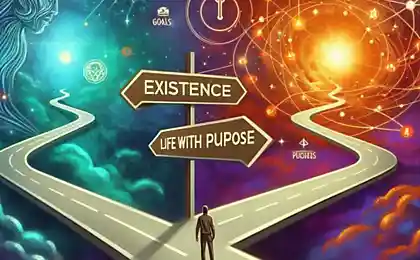638
Happiness or meaning in what we need
Why we seek happiness? Brings us the joy of finding the meaning of life? What modern psychology is about the relationship of these concepts and the meaning for each of us? On the pages of Scientific American came out good material famous psychologist Scott Barry Kaufman, where he understands what happiness is and the meaning of life, and whether there can be compromise between them. Published this brief excursion into the psychology with sketches of the unhappy but meaningful life and a happy but meaningless existence.
People can resemble other creatures in their striving for happiness, but the search for the meaning of life is what makes us human.
— Roy Baumeister.
Seventy five million thirty thousand nine hundred forty six
The pursuit of happiness and the meaning of the two Central motive in the life of each. Many studies in the field of positive psychology show that happiness and meaning, in fact, are the main components of well-being. These two concepts are highly correlated and often feed off each other. The more meaning we find in life, the happier we feel, and the more we experience happiness, the more we are inspired to find new meanings and purposes.
But not always.
The increased amount of research on this subject shows that between pursuit of happiness and search for meaning in life can be as compromises, and disagreements. To recall the "paradox of parenting": young people often report that would be happy to have children, but the parents who live with children, tend to give a very low rating of their satisfaction and happiness.
The impression that parenting may have a negative impact on happiness but increase meaning. Or look at the revolutionaries, who for several years unable to endure the cruelty and violence for a purpose, which ultimately leads to greater satisfaction and sense of meaning in their lives and the lives of others.
In his delightful book "Meanings of life" ("Meanings of Life"), Roy Baumeister uses such examples to prove: people strive not only to happiness but also to finding the meaning of life. The same was said a distinguished Austrian psychiatrist Viktor Frankl, when he described his tragic experience of life in a concentration camp during the Holocaust, and argued that people have a "will to meaning".
In recent years, a series of experiments confirmed these subtle differences between happiness and meaning. In one of studies, Baumeister and his colleagues found that factors such as a sense of connection with others, a sense of productivity, of being alone and the lack of boredom contributed to the emergence of how happiness and meaning. However, scientists also found some important differences in our attitude to these aspects of human existence:
It seems that happiness is more about satisfaction, getting what you want, and the General well-being, while endowing something with meaning associated with unique inner workings of the human search and exploration of self-identity, self-expression and comprehension of past, present and future experience.
Confirmation of this idea can be found in a recent longitudinal study Jo Ann Ayb on the impact of happiness and the creation of meaning. Her work overcomes some of the limitations of previous research in this area, for example, the reliance on surveys of participants and assessment of happiness and meaning at a particular point in time.
Abe analyzes the measure of happiness and a sense of presence of meaning in life of people, based on weekly journals, which were written during one semester. Participants were given the freedom to write what they want, with a detailed analysis of their thoughts and feelings. Thus, this study allowed people to analyze their emotions and make sense of their experience over time.
After that the logs have been checked using a computer program that analyzes text, which was developed by James Pennebaker with colleagues. Happiness was assessed by the frequency of words describing positive emotions (laugh, happy, etc.).
The meaning is a bit more complicated. There is a view that "meaning" is composed of at least two components: cognitive processing, including interpretation and integration of experience and the component of the target, which is more motivational, and includes the active pursuit of long-term goals, such as finding their own identity and the overcoming of narrow self-interests.
Abe evaluated the cognitive component of meaning by analyzing the frequency of causal words ("for example", "because", "cause") and words associated with understanding ("for example", "understand", "realize"). The target sense was estimated by analyzing the frequency of use of pronouns of the third person, which could indicate the long-term perspectives and plans for the future of this third party.
I found Abe? First, the results showed that the frequency of positive emotions was very little to do with assessment of adaptive behavior of subjects at the stage of implementation of their plans (which ranged from six months to 7 years). In fact, positive emotions were more often associated with the suppression of emotions afterwards. This conclusion is consistent with other studies showing that even if the creation of meaning is associated with negative emotions at an early stage, it may promote more flexibility and well-being in the long term.
This discovery also demonstrates the potential dark side of serene happiness. While happiness can make us feel good in the moment, over time, the avoidance of negative thoughts and feelings can stop the growth of personal development. In the end, personal development needs a whole range of emotions. There are also studies that show that long lasting happiness generates in the end an increased sense of loneliness and reduced sense of well-being .
In contrast, the measurement of meaning (of cognitive processes and purposes), it is anyway present in the texts, showed a positive correlation with greater adaptability eksperimentiruesh. In particular, the tendency to cognitive processing were correlated with grit (passion and perseverance in achieving long-term goals), and samodostatochna was strongly associated with gratitude and well-being, and negatively with suppression of emotions.
Moreover, the interaction between cognitive processing and samodostatochna further associated with the degree of adaptation. There is reason to believe that the creation of sense, the most affecting adaptation, if the future prospects to think in terms of a third person (he will, he will succeed, etc.).
This study clarifies some of the provisions of the emerging science of meaning. In the study of meaning and similarities and differences with happiness it is important to use a variety of methods. In addition to the written self-reflection and writing journals other researchers use similar evaluations and genomic methods. To get a more complete picture, we must look at the overall data we obtained through all these methods.
Although this study focused on the differences between happiness and meaning, it should be noted that the optimal state of a person often depends on both factors. As noted by Todd Kashdan with colleagues, "years of research psychology of well-being showed that people are most happy when they are engaged in meaningful lessons and activities, bringing benefit". Indeed, when we are involved in work that corresponds to our best parties (our best selves), we often observe the highest levels of life satisfaction.
In addition to love nobody
The elusive feeling that everything will go like that: Foresight or programming
In my opinion, further exploration of the similarities and differences between happiness and meaning can make a significant contribution to our understanding of the coveted point of emotional well-being: the seemingly magical combination of happiness and meaning based on the importance and the good that ultimately can lead us to a better life. It would be really important.published
Author: Scott Barry Kaufman
Source: monocler.ru/schaste-i-smyisl/
People can resemble other creatures in their striving for happiness, but the search for the meaning of life is what makes us human.
— Roy Baumeister.
Seventy five million thirty thousand nine hundred forty six
The pursuit of happiness and the meaning of the two Central motive in the life of each. Many studies in the field of positive psychology show that happiness and meaning, in fact, are the main components of well-being. These two concepts are highly correlated and often feed off each other. The more meaning we find in life, the happier we feel, and the more we experience happiness, the more we are inspired to find new meanings and purposes.
But not always.
The increased amount of research on this subject shows that between pursuit of happiness and search for meaning in life can be as compromises, and disagreements. To recall the "paradox of parenting": young people often report that would be happy to have children, but the parents who live with children, tend to give a very low rating of their satisfaction and happiness.
The impression that parenting may have a negative impact on happiness but increase meaning. Or look at the revolutionaries, who for several years unable to endure the cruelty and violence for a purpose, which ultimately leads to greater satisfaction and sense of meaning in their lives and the lives of others.
In his delightful book "Meanings of life" ("Meanings of Life"), Roy Baumeister uses such examples to prove: people strive not only to happiness but also to finding the meaning of life. The same was said a distinguished Austrian psychiatrist Viktor Frankl, when he described his tragic experience of life in a concentration camp during the Holocaust, and argued that people have a "will to meaning".
In recent years, a series of experiments confirmed these subtle differences between happiness and meaning. In one of studies, Baumeister and his colleagues found that factors such as a sense of connection with others, a sense of productivity, of being alone and the lack of boredom contributed to the emergence of how happiness and meaning. However, scientists also found some important differences in our attitude to these aspects of human existence:
- The definition of my life how easy or difficult was due to the feeling of happiness and not of meaning;
- A healthy condition is often associated with happiness and not with meaning;
- A good mood, also brought a happy experience, not a sense of meaning;
- Lack of money has a greater effect on happiness than a sense of meaning;
- People whose lives have been meaningful, agreed that "the relations more achievements»;
- People in need were connected with the question of the meaning of life, not happiness;
- Deep thought tied with sense and not with happiness;
- Happiness had more to do with the position of the recipient, not the giver, while meaningfulness was more correlated with the position of the giver, not the receiver;
- The more people felt that their activities were compatible with important for their themes and their values, the more meaning they have invested in their activity;
- The vision of a wise, creative, and even alarming concern sense and had no relation to happiness (in some cases even showed a negative relationship).
It seems that happiness is more about satisfaction, getting what you want, and the General well-being, while endowing something with meaning associated with unique inner workings of the human search and exploration of self-identity, self-expression and comprehension of past, present and future experience.
Confirmation of this idea can be found in a recent longitudinal study Jo Ann Ayb on the impact of happiness and the creation of meaning. Her work overcomes some of the limitations of previous research in this area, for example, the reliance on surveys of participants and assessment of happiness and meaning at a particular point in time.
Abe analyzes the measure of happiness and a sense of presence of meaning in life of people, based on weekly journals, which were written during one semester. Participants were given the freedom to write what they want, with a detailed analysis of their thoughts and feelings. Thus, this study allowed people to analyze their emotions and make sense of their experience over time.
After that the logs have been checked using a computer program that analyzes text, which was developed by James Pennebaker with colleagues. Happiness was assessed by the frequency of words describing positive emotions (laugh, happy, etc.).
The meaning is a bit more complicated. There is a view that "meaning" is composed of at least two components: cognitive processing, including interpretation and integration of experience and the component of the target, which is more motivational, and includes the active pursuit of long-term goals, such as finding their own identity and the overcoming of narrow self-interests.
Abe evaluated the cognitive component of meaning by analyzing the frequency of causal words ("for example", "because", "cause") and words associated with understanding ("for example", "understand", "realize"). The target sense was estimated by analyzing the frequency of use of pronouns of the third person, which could indicate the long-term perspectives and plans for the future of this third party.
I found Abe? First, the results showed that the frequency of positive emotions was very little to do with assessment of adaptive behavior of subjects at the stage of implementation of their plans (which ranged from six months to 7 years). In fact, positive emotions were more often associated with the suppression of emotions afterwards. This conclusion is consistent with other studies showing that even if the creation of meaning is associated with negative emotions at an early stage, it may promote more flexibility and well-being in the long term.
This discovery also demonstrates the potential dark side of serene happiness. While happiness can make us feel good in the moment, over time, the avoidance of negative thoughts and feelings can stop the growth of personal development. In the end, personal development needs a whole range of emotions. There are also studies that show that long lasting happiness generates in the end an increased sense of loneliness and reduced sense of well-being .
In contrast, the measurement of meaning (of cognitive processes and purposes), it is anyway present in the texts, showed a positive correlation with greater adaptability eksperimentiruesh. In particular, the tendency to cognitive processing were correlated with grit (passion and perseverance in achieving long-term goals), and samodostatochna was strongly associated with gratitude and well-being, and negatively with suppression of emotions.
Moreover, the interaction between cognitive processing and samodostatochna further associated with the degree of adaptation. There is reason to believe that the creation of sense, the most affecting adaptation, if the future prospects to think in terms of a third person (he will, he will succeed, etc.).
This study clarifies some of the provisions of the emerging science of meaning. In the study of meaning and similarities and differences with happiness it is important to use a variety of methods. In addition to the written self-reflection and writing journals other researchers use similar evaluations and genomic methods. To get a more complete picture, we must look at the overall data we obtained through all these methods.
Although this study focused on the differences between happiness and meaning, it should be noted that the optimal state of a person often depends on both factors. As noted by Todd Kashdan with colleagues, "years of research psychology of well-being showed that people are most happy when they are engaged in meaningful lessons and activities, bringing benefit". Indeed, when we are involved in work that corresponds to our best parties (our best selves), we often observe the highest levels of life satisfaction.
In addition to love nobody
The elusive feeling that everything will go like that: Foresight or programming
In my opinion, further exploration of the similarities and differences between happiness and meaning can make a significant contribution to our understanding of the coveted point of emotional well-being: the seemingly magical combination of happiness and meaning based on the importance and the good that ultimately can lead us to a better life. It would be really important.published
Author: Scott Barry Kaufman
Source: monocler.ru/schaste-i-smyisl/
Daimler and BYD presented the electric vehicle Denza 400
30 masterpieces of architecture from around the world























